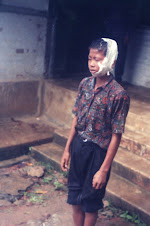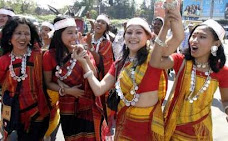In a major development, Chief of Bangladesh Army and de facto ruler of the country, General Moeen U Ahmed visited Dighinala of Chittagong Hill Tracts (CHTs) yesterday i.e. 28 August 2007. While nothing has been made public nor reported in the press in Bangladesh, the visit is significant considering that the government of Bangladesh has intensified the settlement of illegal plain settlers into the CHTs and repression on the indigenous Jumma activists.
The Sadhana Tila area under Dighinala, which comprises of about 300 acres of land, and houses a Buddhist Meditation Center and a sizable indigenous Jumma population, has become the flashpoint of the conflict. Since 13 August 2007, indigenous Jumma peoples and illegal plain settlers supported by the military personnel and the police have been living on the edges of an impending communal riot. Bangladesh army personnel led by Dighinala Zone Commander, Major Qamrul Hassan ordered the Buddhist monks of the Meditation Centre and the indigenous people to leave Sadhana Tila area in order to settle over 800 illegal plain settlers' families.
As indigenous Jumma peoples refused to comply, trucks and jeeps load of illegal settlers have been coming to Sadhana Tila and cutting the jungle around the Buddhist temple for constructing houses under the protection and command of the army and the police personnel. The army personnel have reportedly announced an incentive grant of Taka 50,000 for each settler family who will be willing to settle there, in addition to Taka 1,000 as monthly allowance. The army personnel have also reportedly threatened to cut free food rations to those settlers who do not want to settle in Sadhana Tila area. In the meantime, the local administrator of Dighinala has been asked to provide forged land documents to the settlers.
The illegal settlers are in a riotous mood. On 23 August 2007 at about 5 pm, a group of illegal settlers broke into the temple boundary and began cutting tress and shrubs belonging to the temple. When the Jumma villagers protested, the army and the police falsely accused the Buddhist monks of possessing arms and wanted to search the temple. A violent confrontation between the Jummas and the illegal settlers was narrowly prevented after the intervention of Union Council Chairman, Paritosh Chakma. With the ban on “indoor politics”, Jummas are not in a position to highlight the atrocities.
If the Buddhist temple is destroyed and indigenous peoples living in the Sadhana Tila are evicted even after the visit of General Moeen U Ahmed, it will once again prove that the racist programmes like implantation of illegal plain settlers to decimate indigenous Jumma peoples have the sanction of the highest authority in Bangladesh.
I. Continued forcible land grabbing by illegal settlers and Bangladesh military
The case of Sadhana Tila is not an isolated one. The forcible land grabbing by the illegal settlers and the Bangladesh military has intensified after the imposition of Emergency in January 2007.
In another recent case of forcible land grabbing, the illegal settlers have reportedly grabbed 59 acres of land belonging to 17 Jumma peoples in Kobakhali Mouza (No. 51) under Dighinala Police Station in Khagracahri district. In an operation from 1 to 15 August 2007, large groups of illegal settlers led by former Union Parishad (UP) member Md. Abu Taleb of Hashinchonpur village and former UP member Md Kader of Kobakhali bazaar took control of the hilly lands of the indigenous Chakma peoples with the direct assistance of the army personnel, the para-military forces and the local Village Defence Party members. Due to the presence of the Bangladesh security forces, which provided protection to the illegal setters, the Jummas could not offer any resistance. Presently, works for construction of houses in the lands seized from the indigenous peoples are reportedly underway. The army has reportedly planned to settle 200 plain settlers' families in Kobakhali Mouza.
In June 2007, the Bangladesh military reportedly settled down at least 200 families of illegal settlers at Dantkupya village under Khagrachari district after forcibly evicting 12 indigenous families from their ancestral lands. Earlier, on 8 March 2007, an army camp was set up on the land of an indigenous jumma, Prithwiraj Chakma at Dantkupya village to provide security to the settler families.
In March 2007, the Ruma army cantonment acquired about 7,570 acres of ancestral land of indigenous peoples for expansion of Ruma garrison and ordered more than 4,000 indigenous families mostly belonging to Mro community to leave the area. The Mro leaders have not been consulted before acquiring the land. According to the Movement for Protection of Land Rights and Forest, a land rights organisation based in Rangamati, in Bandarban district alone, 40,077 acres of land have been given in lease to the illegal settlers while a total 94,066 acres of land were acquired for so-called afforestation projects and 75,686 acres were acquired for establishment of military bases in the district.
II. Extrajudicial killings
The Bangladesh military has unleashed a reign of terror across the CHTs by carrying out extrajudicial killings, arbitrary arrests, illegal detention, lodging false cases and terrorizing the people by frequent raids, military operations, torture, threats and intimidation.
At least two indigenous persons have been extrajudicially killed in the custody of the Bangladesh security forces in CHTs since the declaration of Emergency.
On 5 August 2007, Rasel Chakma, son of Paritosh Chakma of Dewan Para village under Naniarchar sub-district in Rangamati district was arrested by the security forces and killed in custody. The security forces claimed that he died of heart attack but the body reportedly bore injury marks.
Earlier On 3 March 2007, a group of army personnel from Ghilachari camp under Naniachar Thana arrested Suresh Mohan Chakma, son of Phedera Chakma at Choichari village in Rangamati district without any warrant or reason. The victim was tortured at Ghilachari army camp in Rangamati district and he died on 7 March 2007, a day after being released.
III. Suppression of indigenous activists
The jumma activists have been unfairly targeted by the Bangladesh military taking advantage of the Emergency situation. Since the declaration of Emergency on 11 January 2007, at least 50 Jumma activists have been arrested, including 20 members of PCJSS and 10 members of UPDF.
False cases such as extortion, kidnapping, murder etc have been lodged against the arrested jumma activists. During raids, the Bangladesh military plant their (army's) arms and ammunitions and claim to have recovered the same from the houses of the indigenous activists to show a ground for arrest. Most cases have been filed under Section 16(b) of the Emergency Power Rules of 2007 which denies release on bail to the accused during the enquiry, investigation and trial of the case. Many have been indicted by courts under the Arms Act.
In July 2007, Satyabir Dewan, General Secretary of PCJSS; Ranglai Mro, Chairman of Sualok Union Parishad (Council) and headman of Sualok mouza; and Bikram Marma, President of PCJSS, Kaptai upazila branch were sentenced to 17 years of jail each by the court in Chittagong under the Arms Act of 1878 for allegedly possessing illegal arms. Another indigenous leader, Sai Mong Marma, Organizing Secretary, Kaptai upazila branch of PCJSS was sentenced to 10 years in jail under the Arms Act.
It has been widely alleged that these indigenous leaders have been implicated under the Arms Act for protesting against the injustices committed by the Bangladesh military in CHTs. For example, Ranglai Mro was targeted for protesting against the eviction of 750 families of Mro indigenous community from their land to make way for an army training centre in remote villages of the Bandarban Hill District in December 2006.
On 3 June 2007, indigenous peoples' human rights defender, Santoshito Chakma alias Bakul (52 years), who also serves as the General Secretary of the Chittagong Hill Tracts Jumma Refugee Welfare Association was arrested by the Bangladesh Police from the Chengi Square in Khagrachari town. His arrest was totally unlawful and politically motivated. He was arrested when he was returning home after attending a meeting of the Task Force on rehabilitation of the returnee Jumma refugees at the Circuit House. The police did not give any reason for his arrest.
On 29 May 2007, Mr Milton Chakma, Assistant Coordinator of the Hill Watch Human Rights Forum and also a leader of United Peoples Democratic Front (UPDF), was arrested from Chengi Bridge in Khagrachari without any arrest memo. Mr Chakma was shown arrested on the basis of a First Information Report (FIR) filed by Md. Shahidul Islam, Sergeant (No. 3998686) of 24 Bengal Regiment. In the army records, he has been shown arrested on 31 May 2007, although the Bangladesh army had picked him up on 29 May 2007 from Chengi Bridge area. He was implicated in a false murder case.
Earlier on 5 May 2007, Tatindra Lal Chakma, Central Member of PCJSS, was arrested in connection with false extortion case filed by Md. Fuyad Hussain, Manager of Grameen Bank of Babuchara branch with Dighinala police station in Khagrachari district. The Bangladesh military allegedly compelled Md. Fuyad Hussain to file the false case against Tatindra Lal Chakma. This was proved when the complainant denied involvement of Tatindra Lal Chakma before the court and the court granted bail to Tatindra Lal Chakma in June 2007. But the bail was cancelled on 23 July 2007 as Md. Fuyad Hussain was forced to withdraw his statement under tremendous pressure from the Bangladesh military. Again on 2 August 2007, two false cases of murder have reportedly been filed against Tatindra Lal Chakma with the Dighinala Police Station to ensure that he is not released from jail. Presently, he has been kept at Khagrachari jail.
IV. Peace in tatters
The Chittagong Hill Tracts Peace Accord has been in tatters much before the care-taker government assumed powers. Even when the democratically elected governments were in power, the army enjoyed unbridled powers which resulted in blatant violations of rights of the Jummas. Since the imposition of the Emergency, the situation in the CHTs deteriorated drastically.
The direction of the High Court on 27 August 2007 to the government of Bangladesh to explain as to why the Chittagong Hill Tracts (CHT) Accord of 1997 signed with the Parbatya Chattagram Jana Sanghati Samity (PCJSS) should not be declared “illegal” has come as a shot in the arms of the military. The two-judge bench comprising Justice Shah Abu Nayeem Mominur Rahman and Justice Zubayer Rahman Chowdhury has already set aside certain provision of the Accord by directing the authorities to allow the illegal plain settlers who were implanted into the Chittagong Hill Tracts to register themselves in the voters' list.
The government will not challenge the directions of the High Court to enroll the illegal settlers into the voters' list. Irrespective of whether the constitutional validity of the Accord is upheld or not, the renewed implantation of illegal settlers and continued land grabbing poses the most serious threat to the indigenous Jumma peoples. With indigenous leaders being implicated in false cases, one can protest against such policies in Bangladesh only at own peril.
skip to main |
skip to sidebar

Military enforcement

Survive

Torture

Raped & Killed Indigenous Jumma Women

Militarization in CHTs

Religious destruction

Land Grabbing

Indigenous Jumma Villeges burnt down

Atrocities


CHTs is a number one of Millitary Zone in the World.

With Traditional Dress
nandawansa

Military enforcement

Survive

Torture

Raped & Killed Indigenous Jumma Women

Militarization in CHTs

Religious destruction

Land Grabbing

Indigenous Jumma Villeges burnt down

Atrocities
Embassy in Los Angeles
About Bangladesh
Refugee in Homeland

News Papers
Audio & Video
Actrocities & Tortures

CHTs is a number one of Millitary Zone in the World.
Jumma Photo Albums
Jumma Links
Jumma Women

With Traditional Dress
Blog Archive
About Me
- IJPNUSA
- The Indigenous Jumma People Net in North America is for the movement of minority Jumma indigenous people in Chittagong Hill Tracts in Bangladesh. E-mail:jpnus@yahoo.com Webpage:-http://jummapeoplenet.blogspot.com/
